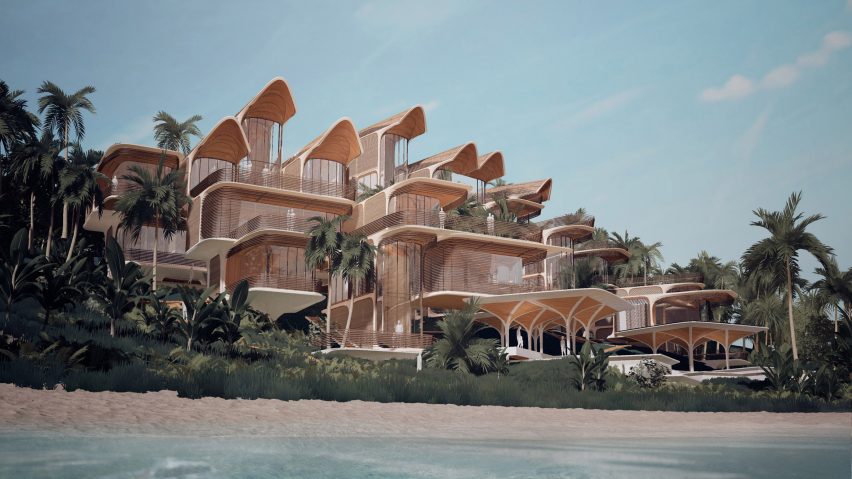Zaha Hadid Architects has designed a modular housing project for an island near Honduras with curved roofs and rounded balconies that can be customised by residents.
Roatán Próspera is a residential community intended for Roatán, a Caribbean island off the coast of Honduras.
Set to break ground later this year, the complex will be a modular construction composed of timber-framed residences with curved palapa roofs, expansive terraces with rounded balconies and green space, designed as a reference to the area's traditional building techniques.
Zaha Hadid Architects (ZHA) intend to use timber from certified forests on mainland Honduras, as part of its aim to develop a localised supply chain in a bid to make the project more environmentally-friendly.
The firm is working with computational engineers AKT II to develop a "kit of parts" outlining elements needed to build Roatán Próspera without material waste.
In the proposal, Roatán Próspera's modules will be fabricated off-site and transported using local networks to cut back on carbon emissions, and also to prevent harm to wildlife on the site.
Residents of the complex will have access to a digital parametric software developed by ZHA's Computational and Design Group to customise the size, arrangement and furnishings of their housing module.
"This digital platform adapts varying configurations of standardised parts to create individual residences that suit each homeowner," the firm added.
Through the interactive platform, residents select the location and size of their personalised unit using "voxels", the name for the three-dimensional volumes of occupational and exclusion right space granted to the homeowner with their selection.
An individual voxel measures 35 square metres and is four metres high. Homeowners can choose just one voxel or use up to five to construct their unit, allowing for 15,000 unique arrangements.
As part of the process users choose their unit's layout and can select from a number of furniture sets and modules, including walk-in wardrobes and conversation pits, or connect with local supplies to design pieces.
According to the firm, the materials and building method allow for fast assembly and disassembly offering residents the freedom to reconfigure or recycle any part of their unit.
Passive strategies developed with environmental engineering consultancy Hilson Moran are also intended to cut back on the building's energy consumption. They include a dehumidifying system that removes water from the atmosphere and filters it for use in residences and shading canopies outfitted with photovoltaic panels.
"The design prioritises sustainability and is integral to our vision for Roatán Próspera," added CEO of Honduras Próspera LLC Erick A Brimen.
"The island of Roatán is already a renowned tourist destination. Roatán Próspera will strengthen and diversify the local economy while creating homes defined by their natural environment."
According to Honduras Próspera the project will break ground this year.
ZHA was founded by late architect Zaha Hadid in 1980. It is now led by architect Patrik Schumacher, who set parametric architectural imagery to music with pianist Rosey Chan in a short film shown during Dezeen's Virtual Design Festival.
This video shows the digital parametric software for residents to customise the size, arrangement and furnishings of their housing module
The firm's recently completed projects include the ME Dubai hotel at the Opus and the One Thousand Museum residences in Miami.
Other projects in Honduras include the design for a new US embassy by SHoP Architects that features a copper-hued lattice facade.

